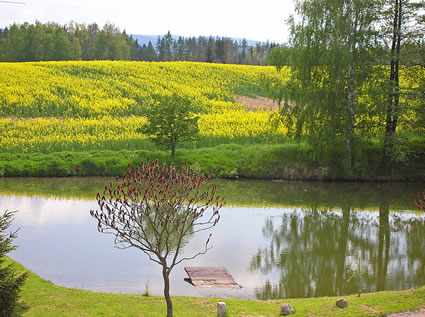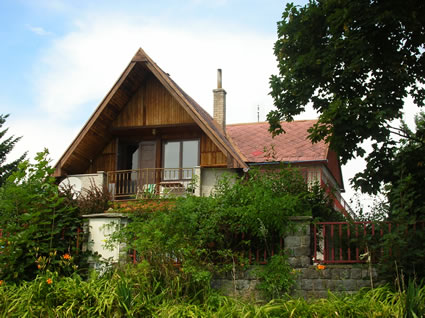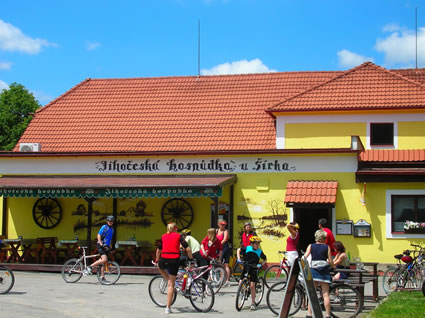Moving, Living and Working in
the Czech Republic
Starting a New Way of Life
Article and photos by
Pearl Harris

|
|
View from my study in our
home in the village of Buková, Czech Republic.
|
The view from my study is one of
golden fields, with the occasional deer out grazing,
a lake in the foreground, forests and mountains in the
distance. At times I have to pinch myself to realize
that it is not all merely a dream.
Making the Move
Six years ago, my husband and I emigrated
to the Czech Republic, where our best friends had settled
and where, during a visit to them, we fell in love with
the land. The peace, security and lack of crime — sadly
absent in our homeland — were what we craved most
of all.
According to our specifications,
these friends subsequently purchased a house on our behalf. So,
without ever having set eyes on our new home apart from
in photographs, and knowing only two people in the entire
country, we sold up and moved from South Africa to the
Czech Republic on March 1, 2002.
Due to the language barrier, the
only employment open to us was English teaching. To this
end, before emigrating, we obtained TEFL certificates
and six-month work visas.
We opted to take all our furniture,
possessions, and pets with us. Thus our Labrador and
cat unwittingly became immigrants, a process involving
reams of paperwork, although fortunately there is no
quarantine for animals imported into the Czech Republic.
The cost of flying our two pets was slightly more than
the airfare of one adult.
Our worldly goods arrived by container
on our new doorstep six weeks after us. Having our pets
and lifetime possessions was a major factor in making
us feel at home in strange, new surroundings, greatly
speeding up the transition process.
Our New Home
Our story-book wooden chalet is
situated in Buková, a few miles from the Austrian
border, a tiny, sleepy village where time has stood still,
the only commercial ventures being a hospoda (pub)
and potraviny (grocery store).

|
|
Writer's wooden chalet home
in Buková.
|
Coffee, Beer, and Social Integration
We soon discovered the villagers
were highly suspicious of “foreigners,” peering
at us from behind lace curtains as we passed by. Our
next-door neighbor, on the contrary, is a friendly Czech
lady who lives alone with her poodle. Soon after our
arrival, Jana invited us by vigorous sign language across
the fence, for kava (coffee) which, in Czech,
as we soon learnt, is synonymous for a feast.
As she speaks only Czech and Russian,
our sole communication is a combination of “Czinglish” and
sign language. Through her tolerance and generosity,
our neighbor offers living testimony to the fact that
there are no language barriers to friendship.
Jana urged us to visit the local hospoda as
soon as possible. Even if it consists of only ten houses,
the tiniest village offers at least one hospoda,
with Czech pivo (beer) being acclaimed the best
in the world. Undoubtedly in communist times, the hospoda brought
much comfort to an oppressed nation, when freedoms taken
for granted today were forbidden.
Adjoining the potraviny is
a square, brightly lit, characterless room. This is The Hospoda. Our
first entrance into the smoke-filled pub caused a major
sensation. There was a deathly hush as all eyes turned
in our direction to stare, the locals never before having
witnessed "foreigners" within their hallowed
walls. Smiling weakly and mumbling, “Dobrý den” (“Good
day”), we hastily seated ourselves at the nearest
table.
Fortunately, a few moments later,
Jana arrived, coming directly over to join us. Her obvious
acceptance of us meant a grudging acceptance of our presence
by the locals, who proceeded with their chatter, albeit
casting curious glances over their beer mugs in our direction
throughout the evening. It took a long time to be accepted,
but we are now regarded as permanent, if slightly odd,
fixtures, smiled at and greeted when we pass by.

|
|
Cyclists taking a lunch break
at a Czech local hospoda (pub).
|
Teaching in South Bohemia
Despite my lack of experience, I
was instantly employed by a private language school in České Budĕjovice,
capital of South Bohemia, and thrown into the deep end
of a demanding job. Through teaching, I met kindly
Czechs from every walk of life, all eager to learn English.
Teaching, despite being nerve-wracking,
provided an insight into the Czech mentality. I got to
know and admire this hardy, tolerant nation in a way
I that would never have been possible without the personal
contact of the classroom. Czechs are naturally inhibited
with strangers, making the task of teaching adults doubly
difficult. However, once I established common bonds with
individuals, teaching became a lot easier.
I also met English-speaking teachers
from all over the globe who were an invaluable source
of information and encouragement in those early difficult
days and with some of whom I have formed lasting friendships. Later,
I expanded my work base by teaching private students
at home, proof-reading and writing for English magazines.
As a non-EU citizen wishing to reside
and work permanently here, I was obliged to go through
the mill of the Foreign Police, entailing an incredible
amount of red tape, frustration, blood, sweat and tears.
As each 6-month term of my visa drew to a close, I had
to appear before the Foreign Police (who speak no foreign
tongues), complete numerous doklady (documents),
drive to the Czech Embassy in Slovakia to hand in my
application, which would then be sent back to České Budĕjovice
for approval — only to be returned to Slovakia to
have the pleasure of another 170-mile trip to collect
it. Years later, when my husband obtained British citizenship,
I was granted 10-year permanent residence, greatly simplifying
life.
Driving in the Czech Republic is
a hazardous venture. In the Communist era, the range
of cars was strictly limited. Today, people have the
means and opportunity to buy fast, powerful vehicles
which they drive kamikaze-like at high speed
on inadequate narrow roads, full of dangerous unmarked
bends. Cyclists who rule the road are another driving
hazard, while pedestrians have the ultimate right of
way.
The Character of the Czech People
The land breeds tough people. In
2006, Europe experienced one of the most severe winters
in decades. Shoveling snow was a new exercise for immigrants
from Africa. As I was out with my shovel, feeling particularly
sorry for myself, an old lady in her eighties walked
briskly past me, carrying a large shopping bag of groceries
and pushing her heavy, antique, gearless bicycle uphill
in deep snow. She told me she had been shopping in the
next village, 2 miles away. At that moment, I decided
that if, at her age, she was able to go shopping on her
bicycle in a blizzard, I too could survive.
Most admirable about the Czechs
is their close-knit family life, very often with three
generations living in apparent harmony under one roof.
Weekends, which begin early on Friday afternoons, are
strictly for relaxation. Many city-dwellers own country
cottages (chaty) as weekend retreats. Families
are seen out cycling or hiking together and participating
in winter sports. New mothers are granted four years’ paid
maternity leave, resulting in children who are well cared-for
and strictly disciplined.
As keen cyclists, we were thrilled
to find our home in idyllic terrain with shady cycle
paths amidst forests and lakes interspersed by quaint
villages. It is an endless source of pleasure to discover
a new route, yet another lake with nesting swans, a virgin
forest, an unexplored village or a different pub — with
sometimes even a different menu.
Czech Cuisine
Czech cuisine is limited and meat-based, Gulaš and Knedliky (dumplings)
being perennial favorites. In the long summer evenings,
we cycle the three miles to Žumberk, a medieval
walled village, to dine in the garden of the popular
pub where waiters now accept me as the strange one who
does not eat meat and asks for everything: “bez
maso” (“without meat”). This is
indeed a risky country for the vegetarian, where even
the innocuous croissant contains meat.
The Challenges and the Rewards
Relocating to the Czech Republic
has been the most challenging, inspiring, exhausting
and rejuvenating experience of my life. The Czech language
(which I despair of ever mastering) is the major
hurdle. However, my knowledge of German is a huge asset,
especially when dealing with bureaucracy.
The harsh climatic conditions, as
compared to the temperate Indian Ocean climate I grew
up in, were a shock to the system. However, I soon learnt
the truism: “There is no such thing as bad weather,
only bad clothes!”
Finally, my new teaching career posed
extreme mental challenges.
Witnessing how the Czech nation overcame
the destructive floods of 2002 was inspirational. I am
not sure where the secret lies to the dauntless spirit
of this determined, hardy nation. Could it be in the
quantities of the world's best beer consumed here, the
tranquility of the countryside, the hills and valleys,
the streams and unspoiled forests, the medieval villages,
majestic castles and magnificent cities such as Prague?
Or could it perhaps be in the hardships so stoically
borne under Communism?
I have yet to discover the answer,
but find myself, at the age of 63, proud to have been
accepted as part of this unique nation.
Online Resources for Expats in the Czech Republic
Expats.cz is
a remarkably comprehensive website which has
been my primary source of information on many
topics, as well as a source of employment. In
the Expats
Business Directory are listings of employment
offers and vacancies, real estate, accommodation,
items for sale, event listings, education, health
and medical, parents and children, visa and
relocation, expat life Q&A, finance, travel & tourism — in
fact every aspect of expatriate living in the
Czech Republic at your fingertips. There is also the possibility
of a free Business Listing on Expats.cz if you wish to advertise your services to
a wide audience. I have obtained most of my
proof-reading and freelance writing work through
this site.
There are numerous employment
recruitment agencies in Prague, many offering
free services — one of these is Grafton
Recruitment, who offer a job posting board and address expats questions and concerns.
English
language schools in the Czech Republic is
a list compiled of possible employers — useful for
sending out employment inquiries before arriving
in the country.
TEFL
International — for TEFL courses
and jobs worldwide.
#VisitCzechia is a site with a wealth of information on the country, culture
and heritage, business, economy, tourism
and sport, work, and study.
|
Pearl
Harris was born in South Africa where she spent
most of her life before emigrating to the Czech Republic
with her husband, Ian, in 2002. Besides travel, her
passions are writing, photography, reading, and animals.
She has a B.A. in English & Linguistics, post-graduate
Diploma in Translation and TEFL qualification. Formerly
an EFL teacher, Pearl now freelances and you can find more information on her website about her work proofreading & editing.
Pearl has been widely published in magazines
and on the web. Her travel memoirs, From
Africa to Buková, and the sequel Where
is my Home? are available on Amazon.com.
|